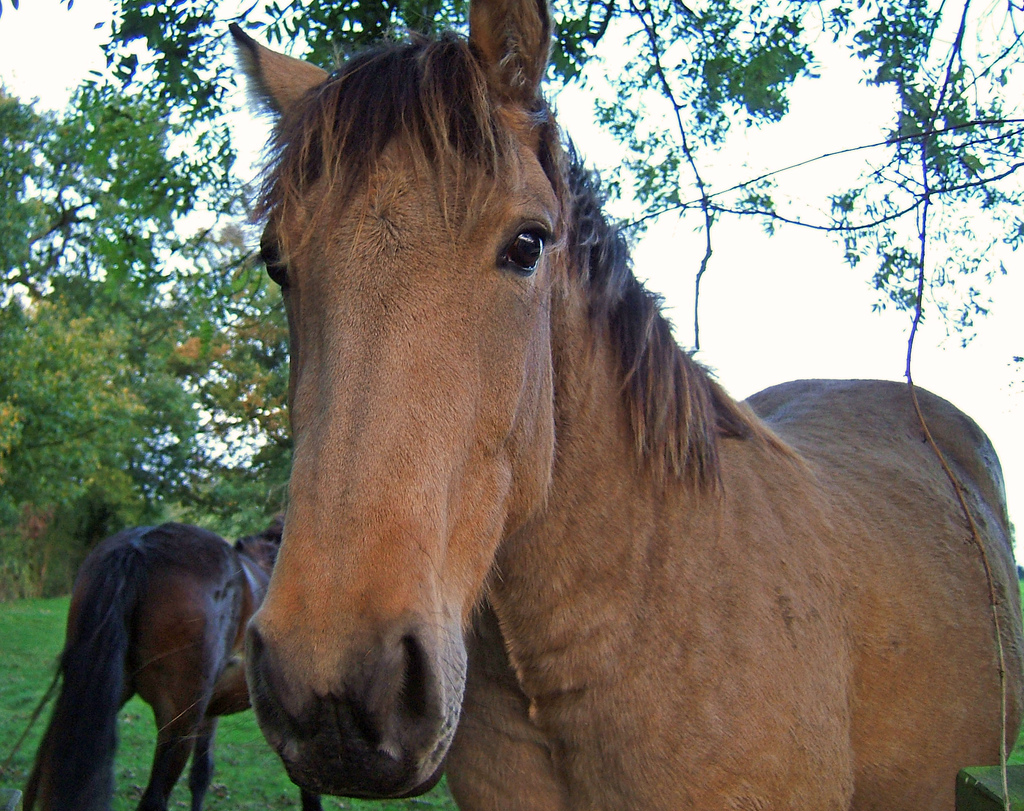Glyphosate Exposure in Horses
At present there is no research on glyphosate exposures specifically for equines. Views on its effects on horses are mostly theory based on observation and studies done on humans, cattle, mice, and chickens.
Glyphosate has been getting a lot of attention for its connection to cancer, but that’s far from the only health concern related to the weed killer. There is a long and growing list of dangers, but one of the biggest ones that doesn’t get a lot of attention is the fact that it’s an endocrine disruptor.
In fact, the glyphosate-based herbicide Roundup can cause damage to the endocrine system at levels that are legally permitted in drinking water. This is according to a study carried out in Australia by researchers at Flinders University. They found that Roundup killed the cells that produce progesterone in women, causing their progesterone levels to drop.
It has also been linked to birth defects, reproductive problems and liver disease, and it has been shown to have the potential to harm the DNA of embryonic cells in humans. In one study, more than 90 percent of the women tested had detectable levels of glyphosate in their urine, and their levels were significantly correlated with having shorter lengths of pregnancy.
It is easy to surmise the effects on equines are likely to be similar to those being found in humans, cattle, chickens, and laboratory animals.
This is bad news when you consider that Roundup is the most popular herbicide in the U.S., where 250 million pounds of it are used each year. Moreover, it has been found that Roundup is more toxic than glyphosate alone, likely due to the synergistic effect of its other ingredients making glyphosate’s effects worse.
This chemical potentially pervades our horse’s environment. It could be present in the vast majority of horse foods, dietary supplements and non-organic plant based bedding. It has been found in ground water and can travel miles in the air during crop spraying where it can be ingested by plants, animals and humans.
Many potential sources of feeds, supplements or pharmaceuticals that could adversely effect horses should be extensively researched. Further investigation is warranted as it has been found that glyphosate levels may be very high in commercial horse feeds.
Due to potentially higher levels present in the horse’s environment, Glyphosate could possibly be responsible for loss of performance and disease in horses. Such as laminitis, PPID, metabolic syndrome/IR, navicular syndrome, gastric ulcers, leaky gut syndrome and other immune conditions. It could even contribute to fertility issues and premature death. (As is being studied regarding the death of 24 race horses at Santa Anita in California, see below for more info.)
From: http://naturalhealingsolutions.co.uk/about/equine-metabolic-syndrome/glyphosate/horses
One of the best ways to naturally and effectively support a horses endocrine system is by using Serene By Nature Equine Calming Cream.
Clinical Effects of Glyphosate in Horses
The use of Glyphosate on crops not only damages the health of plants and soil inhabitants, but results in feed crops that are nutritionally deficient as well as toxic. Crops not treated with glyphosate but grown in contaminated fields can still suffer the chelation effects that interfere with mineral metabolism and reduce nutritional values.
The resulting malnutrition sets the stage for all sorts of problems including immune suppression, inflammatory conditions, gastro-intestinal problems, ulcers, diarrhea and impaired reproduction. All animals are effected but not to the same extent. The least fit or most stressed are the first to show clinical signs with varying degrees of severity.
As well as the more commonly recognized symptoms of Equine Metabolic Syndrome, glyphosate toxicity can adversely affect reproduction including sperm counts, fetal development, gastro-intestinal disorders, reduced immunity, neurological symptoms, kidney disease, increased allergies, and cancers.
Recently in Southern California there were 23 race horse deaths at the Santa Anita Racetrack. Research is now being done to see if glyphosate was the cause of these deaths.
Multiple cases of sudden death during high profile horse race competitions have alerted the general public to this serious health threat for racehorses. Possible causes include rupture of an aortic aneurism and arrhythmias leading to cardiac arrest. Both of these can easily be explained by chronic exposure to glyphosate.
Ref: http://vitatracwellness.com/Images/PDF/Glyshphates_In_RaceHorses.pdf
Hypothesised link between Glyphosate and loss of health in domestic horses
Obtained from Your Natural Horse: The horse is a non-ruminant herbivore. The health of the horses gut determines the over-all health status of the horse and therefore his ability to perform. Given the scientific data and arguments, the possible effect of glyphosate on horses could be summarized as impaired homeostasis and metabolic function leading to chronic disease, loss of performance and even premature death.
Given the complexity with which glyphosate is thought to affect mammals, the following signs or diseases could indicate glyphosate exposure in horses:
- Behavior associated with gut dysbiosis, e.g. “girthiness”, saddle fitting issues, lameness or gait anomaly (especially involving the right hind limb), poor performance, training issues, cribbing or wind sucking, box walking, depression, etc.
- Diseases associated with gut dysbiosis
- Obesity (with or without fat pads)
- Anorexia, muscle loss or malnutrition
- Back pain/hind limb lameness/suspensory ligament “diseases”
- Exercise intolerance/chronic fatigue
- Diseases such as insulin resistance, PPID and metabolic disease
- Navicular syndrome/disease (or other non-trauma lameness involving the musculo-skeletal system)
- Equine Digital Elastosis / laminitis / weak or deformed hooves
- Fertility problems
- Liver/kidney disease
- Colic
- Increased incidence and severity of infections, including parasites
- Allergies and intolerances such as sweet-itch and an intolerance to grass
- Increased chemical sensitivity with reactions and loss of health in response to wormers, vaccinations, medications and environmental pollutants.
This list is not exhaustive and clearly more research needs to be done on the effects of glyphosate on horses.
Ref: http://your-natural-horse.com/natures-pharmacy/homeopathy/
Glyphosate’s use continues to rise
Monsanto brought it to market in 1974 under the trade name Roundup. It really took off in 1996, when Roundup Ready GMO crops were first introduced in the U.S.; Americans’ exposure to the chemical grew 500 percent in the years from 1996 to 2017. By 2016 there was a 100-fold increase from the late 1970s in the frequency of applications and volumes of glyphosate-based herbicides (GBHs) applied, partly in response to the unprecedented global emergence and spread of glyphosate-resistant weeds.
Around the world, 9.4 million tons of glyphosate have been sprayed on fields, so it’s no wonder we are finding it everywhere.
It’s up to everyone to become aware, to share this awareness, and to make the needed changes that are clearly crucial to all of our futures!

Disclaimer: Serene by Nature, nor any third party associated with, related to, or linked to their businesses or websites, expressly disclaims any responsibility for, and makes no representations or warranties regarding, any statement, information, materials, or content found on or included in Serene by Nature’s marketing materials/websites, or any third party marketing materials/websites related to, associated with or linked to Serene by Nature’s business or website. Serene by Nature is not intended to diagnose, treat, cure, prevent any disease or replace proper medical care. These statements have not yet been approved by the FDA.
